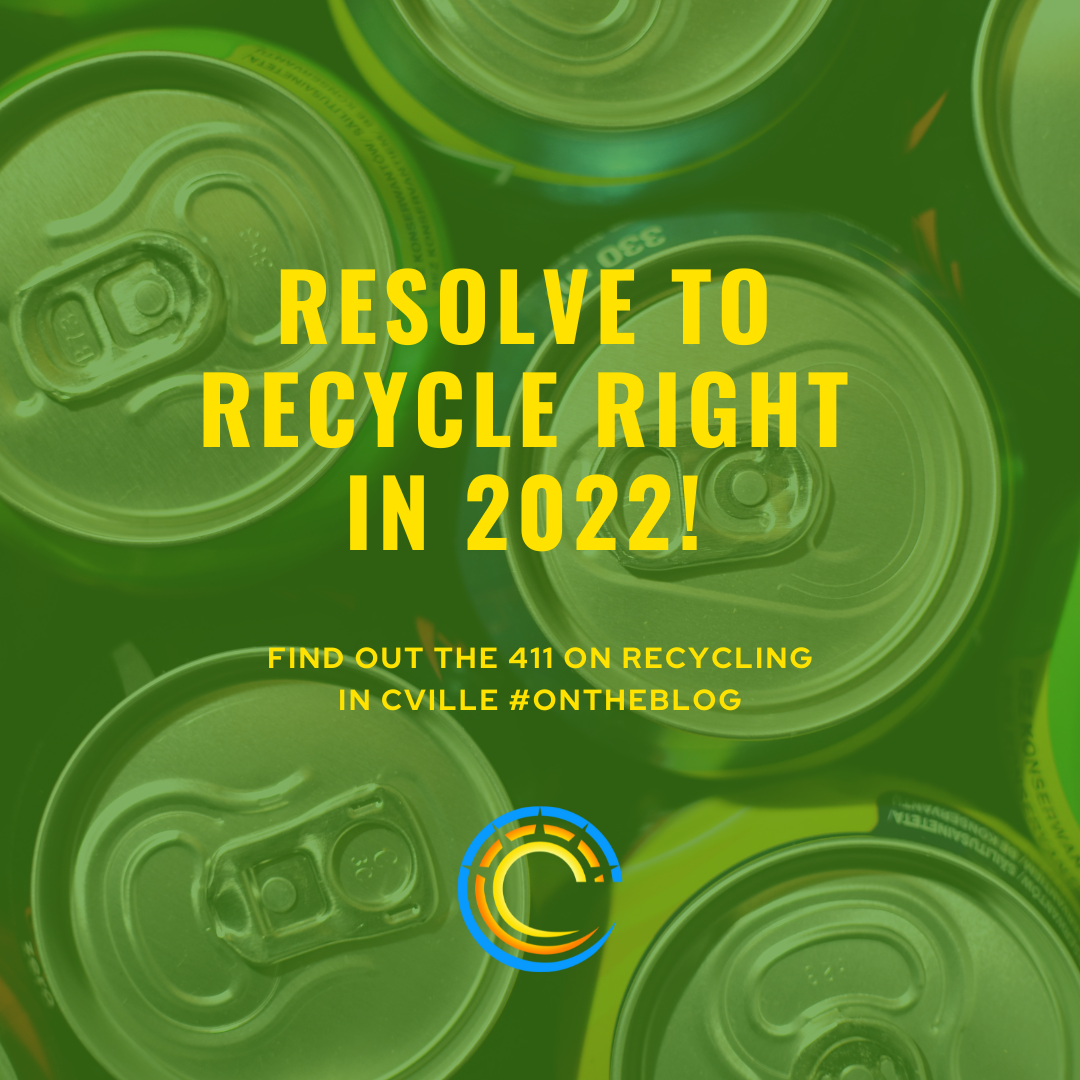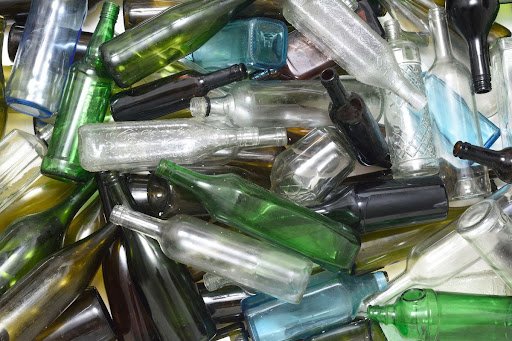Resolve to Recycle Right in 2022! Here’s How
When it comes to recycling in Charlottesville, let’s face it: it’s messy AND confusing! Between China’s 2018 policy to block of U.S. recyclables to mixed messages on what’s recyclable and what’s not, to the ever-changing landscape of available recycling providers, it’s hard to know what is the right thing to do. Enter C3 and Better World Betty for help. Thanks to C3/Betty volunteer, Christine Putnam (also a County Solid Waste Alternatives Advisory Committee (SWAAC) member and retired science teacher), we’ve put together this blog (updated from 2018 popular “How to Recycle in Charlottesville Now”. This blog is cross posted at betterworldbetty.org.
Now more than ever, it’s important to recycle right to ensure that the items we put in our curbside bin are actually getting recycled, i.e. reused or turned into new products. “Wish cycling” only adds contaminants and subsequent higher costs to the recycling stream.
What items can go in my City or County curbside recycling bin?
Clear and transparent #1 PETE rigid plastic containers
#2 HDPE plastic bottles like milk and detergent containers
Aluminum, tin, and steel metal cans
Paper products: cardboard, newspaper, magazines, junk mail, food boxes, and phone books
#3-7 Plastics are accepted depending on the vendor (see below and the exception: NO Styrofoam); however due to the low value, challenges of recycling some of these plastics, and vendor transparency the details of what happens to them unfortunately goes beyond the scope of this blog.
Glass*
Note: don’t put items smaller than a tennis ball in your curbside recycling bin. Those items are likely to fall through the machinery at recycling sorting facility, act as a contaminate, or jam the machinery.
*is accepted in City curbside for now, but County Waste (GFL) is moving away from accepting glass so we recommend taking your source-separated glass to McIntire Recycling or Ivy MUC Recycling.
There are three materials that can be recycled, but we recommend NOT PUTTING them in your curbside recycling bin:
If we truly want these recyclables to gain a second life as a new consumer product made from recycled materials, don’t put them in your curbside bin.
1- Glass Containers
This one may surprise you, but glass in curbside is the bane of many a curbside recycling program because it breaks and contaminates other valuable recyclables.
The best way to recycle glass containers is to bring it to the McIntire or Ivy Recycling Center where it is source separated and sent to Strategic Materials Inc (SMI) in Durham, North Carolina. There it is melted down into what is called a “glass cullet”. This cullet is used to make new glass containers or fiberglass insulation.
County Waste services Charlottesville City and many Albemarle County customers. Time Disposal has been purchased by County Waste which is now a subsidiary of GFL (*Green for Life) Environmental Inc, a waste management company with headquarters in Canada. GFL has updated its list of acceptable materials for Albemarle County customers and glass containers are no longer on that list. We like this explanation from Fairfax County as to why they no longer accept glass in curbside bins:
“Glass creates many problems for single-stream recycling. It is heavy, which adds cost to transporting recyclables to and from recycling centers. Glass [also breaks] during collection and transport to Material Recovery Facilities, or MRFs, where recyclables are sorted. The abrasive broken glass damages the machinery at the MRFs. Glass also contaminates bales of other more valuable items, such as cardboard and metals. [Therefore] most glass passes through the recycling process as residue, or waste. Some of the glass is applied as alternative daily landfill cover, an approved use by the Virginia Department of Environmental Quality, but most of it is simply landfilled with other unrecyclable waste.” (Fairfax County.gov)
Is it worth the trip to McIntire or Ivy recycling centers to recycle your glass? Yes!
Recycling one glass bottle saves enough energy to light a 100-watt light bulb for four hours. Recycling glass takes 30% of the energy required to produce glass from raw materials.
Glass can be recycled over and over again!
2- Flexible Plastic Film 2 and 4 (e.g. wrapping around toilet paper, grocery bags, etc)
When I drive around my neighborhood on recycling day, it pains me to see people putting their recyclables in a big plastic bag and then into the recycling bin thinking it’s helping the sorting facility. It’s not!
Plastic films are DESTRUCTIVE to recycling equipment. It wraps around the sorting machinery at the MRF and must be hand-picked out of the stream. To recycle properly, take your clean, dry plastic films to the McIntire or Ivy Recycling Center, or to grocery stores that accept plastic bags. They will be sent to the Trex facility in Winchester, VA.
Trex makes recycled plastic splinter-free lumber for decks and benches. Not all plastic films can be used in this process.
Pro tip: if you can stretch the plastic film with your finger then it is made from polyethylene (PE) #2 HDPE or #4 LDPE and it can be used. If you cannot stretch the plastic, it is probably made from polypropylene (PP) #5 which is not able to be recycled or used to make Trex materials at this time. You can learn about the recycling process and the types of films that are accepted on the Trex website.
3- Organics: Food Waste, Compostable Food Containers, and Yard Waste
Food Waste and Compostable Food/Beverage Packaging Options
If you do not have space for backyard composting, you have several easy options.
1. Mcintire or Ivy Recycling Centers. You can bring your food scraps and compostable containers including PLA cups to the McIntire or Ivy Recycling Centers. Compostable bags are available for free or you can avoid using this additional resource with a reusable container.
2. Black Bear Composting provides curbside compost pickup in the City of Charlottesville, Crozet, and some urban areas of Albemarle County.
3. And there is a new company on the composting scene: Life Cycle Organics. They serve the City of Charlottesville, parts of Albemarle County, and Lake Monticello.
What about Yard Waste (leaves and vegetative clippings)?
Whenever possible, leave your leaves in place to revitalize and improve the soil. Leaf litter helps the soil retain moisture, it suppresses weeds, and it is vital for butterflies, frogs, box turtles, insect-eating songbirds, and many other wild creatures. For lawns, rake the leaves to a spot where they can decompose naturally. If you don’t have the space, however, using a mulch mower is an option. The mulched leaves will quickly break down to naturally fertilize your lawn and improve the soil. Likewise with grass clippings. Brush and other woody yard waste can be piled up in a corner of your yard to provide shelter for birds. If necessary you can take it to the Ivy Material Utilization Center where it will be ground into mulch for resale.
Keeping organics out of the landfill is an important climate solution with the added benefit of improving the soil.
What about all the other things that could be reused, recycled, or require special disposal?
Here is a Quick Reference Guide created by the County SWAAC Committee: Recycling, Reuse of Materials, and Disposal of Hazardous Waste in Albemarle County (PDF)
There are a few changes to the recycling haulers in town. County Waste of Virginia LLC is now a subsidiary of GFL Environmental as we mentioned above. Time Disposal is now part of County Waste.
If you live in the City of Charlottesville your curbside recycling is picked up by County Waste and transported to Zion Crossroads. Then is hauled to their sorting facility for recyclables only or “clean MRF” in Chester, VA. From there they try to find markets to buy their commodities.
Recycling and Trash Haulers in the County
If you are an Albemarle County resident, you can shop around for recycling haulers. Most haulers charge $6-8 for bi-monthly curbside recycling pickup with a trash pickup subscription. Here are some of your options depending on where you live.
Quality Disposal Shout out to Jesse Rogers for getting back to us promptly to answer all of our questions. Quality Disposal is locally owned and operated by Chelsea Mapanoo serving Earlysville, Ivy, and certain areas around Charlottesville. Quality Disposal source separates your recycling at the Ivy Recycling Center (that does not take #3-7 plastics). They pick up recycling every week with your trash. You can arrange for it to be picked up from your garage or backyard so you don’t need to carry it to the curb. This is a big plus if you have a long driveway. For more information:434-981-3123.
Neighborhood Disposal Locally owned and operated serving the area north of Charlottesville and many of the urban areas in Albemarle County. Recycling is transported to Zion Crossroads and then to a clean MRF in Manassas, VA.
County Waste - is a subsidiary of GFL serving most of Albemarle County. Taken to Chester, VA and then to recycling markets.
Evergreen Recycling is locally owned and operated by Mike Kruse who is super knowledgeable on recycling. He specializes in helping businesses, schools and apartment complexes manage their recycling. He separates recyclables and takes them to McIntire Recycling Center (that does not take #3-7 plastics) and the Paper Sort.
DIY Recycling: Who doesn’t love RSWA’s McIntire Recycling Center? The McIntire Recycling Center is open every day except Tuesdays. They have a knowledgeable and helpful staff and recycle nearly all products that can be recycled. You might even see a volunteer Recycling Ambassador who would be thrilled to answer your questions. Common items they do not take are styrofoam and #3-7 plastics. The Ivy Material Utilization Center is open every day except Sundays and offers the same recycling options as McIntire Recycling Center.
Where Does McIntire Take my Recyclables?
Because the Rivanna Solid Waste Authority (RSWA) is a quasi-government agency, they must disclose where they take their recyclables. The private sector is not required to do that. So here is a quick list of items accepted at Ivy and McIntire Recycling and where they go. (Click here for a more detailed list of acceptable recyclables).
Office paper goes to Sonoco Recycling in Madison Heights, VA. Sonoco sends most of that paper to a Georgia Pacific plant near Savannah Georgia. This is the largest tissue paper plant in North America. They make tissues, toilet paper, and paper towels.
Newspaper goes to Sonoco paper mill in Richmond, VA where it is recycled into more newsprint.
Cardboard goes to Sonoco paper mill in Richmond, Va where some of it ends up in packaging, like new Pringles containers, (yes the round ones.)
Plastic numbers 1 and 2 goes a Sonoco Recycling MRF in Raleigh, NC
Flexible Plastic Film 2 and 4 go to TREX in Winchester, VA to be made into plastic lumber products
Aluminum Cans go to Gerdau Metals in Roanoke, VA where it is sent off to be turned into new Aluminum Cans. True recycling, just like the recycling symbol, one thing turned back into itself.
Mixed metal, mostly steel, or tin cans go to Gerdau as well.
Glass Containers go to Strategic Materials Inc in North Carolina to be made into new bottles or fiberglass insulation
Compostable Food Waste is hauled to Panorama Farm in Earlysville and turned into compost.
Hope that helps! Please email any other burning recycling questions or conundrums to betterworldbetty@gmail.com.
–Teri and Christine
If you enjoyed this article, please consider signing up for our monthly newsletter!




